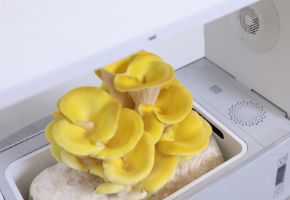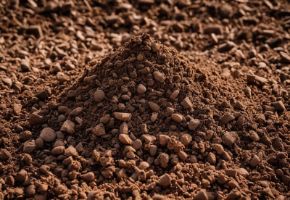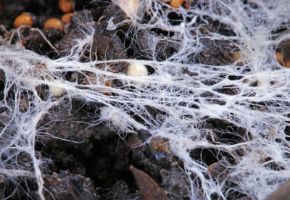Immune modulation: let's start with Maitake...
Grifola frondosa, whose common name "maitake" means "dancing mushroom" in Japanese, perhaps for the joy of those who found it or for its shape reminiscent of a dance of butterflies, is a basidiomycete that grows primarily at the base of oak, beech, and chestnut trees.
It is a polypore mushroom, known for its imposing size which can reach and exceed 50 cm in diameter and 20 kg in weight. Historically, in traditional Chinese and Japanese medicine, it has always been revered not only for its flavor but especially for its beneficial properties, so much so that it was considered more valuable than silver.
Today, scientific research is validating many of these ancient beliefs, focusing particularly on its unique ability to interact with the human immune system through a mechanism known as immune modulation. Unlike simple stimulation, which could be counterproductive in conditions of immune hyperactivity, modulation represents a balanced and intelligent action, capable of rebalancing and optimizing the body's defensive response.
Maitake's active compounds: discovering the secrets of its potency
Maitake's power lies in its complex and rich biochemical composition. It is a veritable concentrate of biologically active molecules, each contributing to its properties of immune modulation.
Beta-glucans: the generals of the immune army
The most studied and probably most important components of maitake are polysaccharides, particularly beta-glucans. These long chains of glucose molecules, linked by specific glycosidic bonds, are immunomodulators par excellence. Not all beta-glucans are the same: their biological activity depends on their three-dimensional structure, molecular weight, type of bond, and degree of branching.
Types of beta-glucans in Maitake
- Beta-D-glucan (1→6) - branched: this is considered the most active polysaccharide in maitake. Its branched structure allows it to be efficiently recognized by receptors of the innate immune system.
- Grifolan: a specific beta-glucan isolated from maitake, known for its potent ability to activate macrophages and induce cytokine production.
- D-Fraction: perhaps the most famous and commercialized fraction. It is a proteoglycan extract (a protein-polycaccharide complex) where the beta-glucan is bound to a protein. This combination significantly increases its bioavailability and efficacy. Studies have shown that the D-Fraction is up to 30% more effective in macrophage activation compared to pure polysaccharides.
| Mushroom | Main beta-glucan | Bond type | Relative immunomodulatory activity* |
|---|---|---|---|
| Maitake (Grifola frondosa) | Grifolan, D-Fraction | β-(1→3)/(1→6) | 1.0 (Reference) |
| Reishi (Ganoderma lucidum) | Ganoderan | β-(1→3)/(1→6) | 0.8 |
| Shiitake (Lentinula edodes) | Lentinan | β-(1→3)/(1→6) | 0.7 |
| Cordyceps (Cordyceps sinensis) | Cordyglucan | β-(1→3)/(1→4) | 0.6 |
| Turkey Tail (Trametes versicolor) | PSK (Krestin), PSP | β-(1→3)/(1→4) | 0.9 |
*Indicative value based on in vitro studies and animal models for macrophage activation. Actual potency may vary based on extraction method and form of intake.
Other active components: the support team
Beyond the famous beta-glucans, maitake contains a synergy of compounds that support and amplify its action:
- Potassium salts and trace minerals: essential for the proper enzymatic functioning in hundreds of cellular processes, including immune ones.
- B vitamins and ergosterol (precursor to vitamin D2): support energy metabolism and immune regulation.
- Enzymes and antioxidants: protect cells from oxidative damage, which can weaken the immune system.
- Unique alkaloids and sterols: contribute to the mushroom's adaptogenic and metabolic support properties.
This complex synergy of compounds is what makes maitake superior to the sum of its individual parts, a concept known in phytotherapy as the "entourage effect."
Mechanisms of immune modulation: how Maitake "talks" to our immune system
The immune modulation performed by maitake is not a single event, but a complex, multi-level dialogue with the different components of our defense system.
Interaction with the innate immune system: the first line of defense
The innate immune system is our rapid, non-specific response to invaders. Maitake significantly enhances it.
Macrophage activation
Maitake's beta-glucans, particularly the D-Fraction, are recognized by specific receptors on the surface of macrophages, such as the Dectin-1 receptor and the complement receptor 3 (CR3). This interaction "switches on" the macrophage, transforming it from a quiescent cell into a powerful killer cell. The activated macrophage increases its capacity to phagocytose (engulf) bacteria, viruses, and tumor cells; produces reactive oxygen species (ROS) to kill pathogens; and secretes a wide range of cytokines, chemical messengers that coordinate the immune response. A 2011 study published in the "Journal of Medicinal Food" showed that maitake extract increased macrophage phagocytic activity by 40-60% compared to the control group.
Stimulation of natural killer (NK) cells
NK cells are the lynxes of the immune system, specialized in identifying and destroying virus-infected cells and tumor cells. Maitake polysaccharides enhance their cytolytic (killing) activity. Research indicates that maitake intake can increase NK activity by 25-c35%, making them more efficient at recognizing and eliminating threats.
Mobilization and activation of neutrophils and dendritic cells
Neutrophils are the most abundant white blood cells and are crucial for fighting bacterial infections. Dendritic cells are the "sentinels" specialized in capturing antigens and presenting them to the adaptive immune system, activating it. Maitake promotes the migration of these cells to infection sites and enhances their effector functions.
Interaction with the adaptive immune system: the specific response and memory
If the innate system is the infantry, the adaptive system is the specialized army with memory. Maitake also modulates this more sophisticated response.
Modulation of T helper (Th) lymphocyte activity
T helper lymphocytes are the conductors of the immune response. They are mainly divided into two subpopulations: Th1 (which promote a cell-mediated response, effective against viruses and tumors) and Th2 (which promote a humoral response, with antibody production, effective against parasites). An imbalance between Th1 and Th2 is at the root of many allergic and autoimmune diseases. Maitake has demonstrated a biphasic capacity: it tends to shift the balance towards Th1 in conditions where Th2 predominates (such as in allergies), promoting a more balanced response. This is the heart of its immune modulation action and not mere stimulation.
Stimulation of B lymphocytes and antibody production
B lymphocytes are responsible for antibody production. Studies on animal models have shown that maitake supplementation can increase levels of specific immunoglobulins, such as IgG and IgM, in response to vaccinations or infections, indicating support for the humoral response when needed.
Regulation of cytokines
Maitake's effect on cytokine production is complex and targeted. It promotes the secretion of pro-inflammatory cytokines when needed (e.g., Interleukin-1 (IL-1), Interleukin-6 (IL-6), Tumor Necrosis Factor alpha (TNF-α) to initiate an effective response), but can also modulate the production of anti-inflammatory cytokines (e.g., IL-10) to prevent an excessive and damaging response. This balancing is crucial to prevent a cytokine storm, a hyper-violent immune reaction that can be lethal.
| Immune cell / cytokine | Effect of maitake | Functional result |
|---|---|---|
| Macrophages | Activation via Dectin-1/CR3 receptors | ↑ Phagocytosis, ↑ ROS production, ↑ antigen presentation |
| Natural Killer (NK) Cells | Enhanced cytolytic activity | ↑ Recognition and destruction of infected/tumor cells |
| Dendritic Cells | Maturation and activation | ↑ Migration to lymph nodes, ↑ T lymphocyte activation |
| T Helper Lymphocytes (Th1) | Modulation towards Th1 response | ↑ Cell-mediated response against viruses and tumor cells |
| Interleukin-12 (IL-12) | Increased production | Potent activator of Th1 cells and NK cells |
| Interleukin-10 (IL-10) | Contextual modulation | Anti-inflammatory action, prevents hyperactivation |
The role of the gut: where Maitake meets the microbiome
A separate chapter deserves the interaction between Maitake and the intestinal immune system, which hosts about 70-80% of our immune cells. Beta-glucans, being soluble fibers, partially arrive undigested in the colon, where they become nutrients (prebiotics) for the gut microbiome. Beneficial bacteria, such as Bifidobacteria and Lactobacilli, ferment these fibers producing short-chain fatty acids (SCFAs), particularly butyrate. Butyrate is a crucial nutrient for intestinal wall cells (enterocytes) and possesses potent anti-inflammatory and immune-regulatory actions at the systemic level. Therefore, maitake indirectly supports immunity also by nourishing a healthy microbiome, which in turn constantly dialogues with the gut-associated lymphoid tissue (GALT).
Scientific evidence: a review of the most significant studies
The theory of maitake's immune modulation is solidly supported by a growing body of scientific literature, ranging from in vitro studies and animal models to human clinical trials.
In vitro and animal model studies
Preclinical research has laid the foundation for understanding the mechanisms of action.
Macrophage study (2011)
As mentioned, a study in the "Journal of Medicinal Food" unequivocally demonstrated macrophage activation. Researchers observed not only an increase in phagocytosis but also a spike in nitric oxide (NO) and TNF-α production, hallmarks of immune activation.
Cancer study (2009)
Research published in "Cancer Immunology, Immunotherapy" examined the effect of Maitake on mice with tumors. The group treated with maitake extract showed significant inhibition of tumor growth (up to 75% in some models) compared to the control group. This effect was directly correlated with increased activity of NK cells and cytotoxic T lymphocytes within the tumor microenvironment.
Infection study (2015)
An investigation in the "International Journal of Medicinal Mushrooms" tested the protective effect of Maitake against bacterial infections. Mice treated with maitake before being exposed to a pathogen showed a significantly higher survival rate and a considerably reduced bacterial load in organs, demonstrating a more effective preparation of the immune system.
Human clinical studies
Translating research to humans is the most important and complex step. The results are promising.
Study on immune support in healthy subjects (2013)
A randomized, double-blind, placebo-controlled study conducted on a group of healthy men and women evaluated the impact of taking maitake for 4 weeks. The group that took maitake showed a significant increase in NK cell activity and lymphocyte proliferative response (a marker of their ability to activate) compared to the placebo group, with no adverse effects. This suggests a defense-boosting effect even under normal conditions.
Oncology studies
Several pilot studies have explored the role of maitake as a complement to conventional cancer therapies.
- A 2009 study on breast cancer patients reported that taking Maitake D-Fraction alongside chemotherapy led to an increase in immune cell activity (lymphocytes and NK cells) and a reduction in chemotherapy-induced side effects.
- A 2012 study on colorectal cancer patients observed that Maitake supplementation improved quality of life and mitigated chemotherapy-induced immune suppression.
Study on metabolic syndrome and inflammation (2015)
A clinical trial published in the "Journal of Dietary Supplements" administered Maitake extract to patients with metabolic syndrome. In addition to improving some metabolic parameters, the treatment significantly reduced inflammatory markers such as C-Reactive Protein (CRP) and IL-6, demonstrating its anti-inflammatory and immune modulatory action in a condition of chronic low-grade inflammation.
| Studied condition | Study design | Main results | Reference (example) |
|---|---|---|---|
| Healthy Subjects | RCT*, 4 weeks, n=50 | ↑ 25% NK cell activity, ↑ lymphocyte proliferative response | J Med Food, 2013 |
| Breast Cancer (with chemo) | Pilot study, n=34 | ↑ Lymphocyte and NK activity, ↓ chemo side effects | Cancer Immunol Immunother, 2009 |
| Metabolic Syndrome | RCT, 8 weeks, n=30 | ↓ CRP (21%), ↓ IL-6 (15%), improved glycemic profile | J Diet Suppl, 2015 |
| Hyperlipidemia | Observational study, n=30 | ↓ LDL Cholesterol (12%), ↑ HDL Cholesterol (8%) | Mol Nutr Food Res, 2010 |
*RCT: Randomized Controlled Trial - The Gold Standard of clinical research.
Practical applications: how to integrate Maitake into daily life
Understanding the science is fundamental, but the practical aspect is equally important. How can we benefit from the immune modulation offered by maitake?
Forms of intake: from whole mushroom to concentrated extracts
Maitake is available in various forms, each with its pros and cons in terms of active compound concentration, bioavailability, and practicality.
- Whole dried mushroom and powder: this is the simplest and least processed form. It can be rehydrated and used in cooking (soups, stews, sauces) or powdered and added to smoothies and drinks. This form contains all the fibers and nutrients of the mushroom, but the concentration of bioavailable beta-glucans is lower than in extracts. It is ideal for culinary use and general wellness support.
- Powdered extracts: obtained through extraction processes (often with hot water) that break down the chitinous cell walls of the mushroom, releasing water-soluble polysaccharides like beta-glucans. This form is much more concentrated in active compounds (especially beta-glucans) compared to whole mushroom powder. It is typically standardized based on polysaccharide content (e.g., 30% or 40%).
- Liquid extracts and tinctures: alcoholic or hydro-alcoholic extracts that extract both water-soluble (beta-glucans) and fat-soluble compounds. They are highly absorbable and easy to dose.
- Capsules and tablets: the most common and practical form for supplementation. They typically contain whole mushroom powder or, more effectively, powdered extract. They allow for precise and standardized dosing. Look for products that specify the beta-glucan or polysaccharide content.
The choice of form depends on the goal:
General support and culinary use: whole dried mushroom or powder.
Specific immune support and active modulation: powdered extracts, extract capsules, or tinctures.
Dosage: finding the right amount
The optimal dosage is not universal and varies based on the form, product concentration, goal, and individual. The following are general guidelines based on scientific literature and traditional use.
- For whole dried mushroom (culinary use): 5-15 grams per day.
- For whole mushroom powder: 1-3 grams per day.
- For powdered extracts (standardized to 30% polysaccharides): 500 - 1500 mg per day.
- For D-Fraction (purified extract): 1 - 2 mg per kg of body weight per day, often divided into two doses.
For a general immune modulation effect, one can start with a dosage in the lower range (e.g., 500 mg of extract per day) and assess the body's response. Under conditions of specific support (e.g., during flu season or periods of intense stress), the dosage can be temporarily increased towards the medium-high range. It is always advisable to follow the manufacturer's instructions and, in case of pathological conditions, consult a health professional experienced in mycotherapy.
Synergies with other mushrooms and plants
Maitake does not act in isolation. It can be synergized with other medicinal mushrooms for a more complete action:
- Maitake + Reishi (Ganoderma lucidum): Reishi is known for its adaptogenic properties and modulation of the nervous and immune systems. Together, they offer deep immune support and a calming, anti-inflammatory action.
- Maitake + Cordyceps (Cordyceps sinensis/militaris): Cordyceps is excellent for supporting energy, endurance, and respiratory function. The combination is ideal for athletes or those seeking immune and energy support.
- Maitake + Vitamin C: Vitamin C supports the function of neutrophils and lymphocytes and acts as an antioxidant, protecting immune cells from oxidative stress. It enhances the action of maitake.
Safety and side effects
Maitake is generally considered safe and well-tolerated. It is classified as GRAS (Generally Recognized As Safe) in the United States. Side effects are rare and generally mild, may include minor gastrointestinal discomfort in sensitive individuals. Due to its potent action on the immune system, caution is necessary in:
- People with autoimmune diseases (e.g., multiple sclerosis, lupus, rheumatoid arthritis): Theoretically, since maitake can enhance the immune system, it could worsen symptoms. Its use should be supervised by a doctor.
- People taking immunosuppressant drugs (after an organ transplant or for autoimmune diseases): Maitake could interfere with the action of these drugs.
- People scheduled for surgery: It is recommended to stop intake at least two weeks before surgery due to its effect on blood sugar and the immune system.
In case of pregnancy, breastfeeding, or specific medical conditions, it is always mandatory to consult your doctor before taking maitake supplements.
Further reading
To further explore the fascinating world of mycotherapy and beta-glucan research, the following authoritative resources are recommended:
- National Center for Complementary and Integrative Health (NCCIH) - Medicinal Mushrooms - a US government portal providing evidence-based information on medicinal mushrooms.
- PubMed - the search engine of the National Library of Medicine, where you can find all the scientific studies cited in this article and many more by searching for "Grifola frondosa" or "maitake immune".
- Mycological Society of America - a professional organization dedicated to the advancement of mycological science, with educational and research resources.
Immune modulation: future perspectives
The journey into the world of Grifola frondosa and its extraordinary capacity for immune modulation reveals the profound wisdom of nature and the still-untapped potential of the fungal kingdom. Science, though with much road still to travel, has made giant strides in validating the traditional uses of Maitake and in describing the sophisticated molecular mechanisms through which its beta-glucans, particularly the D-Fraction, dialogue with our immune system, rebalancing and enhancing it in an intelligent and contextual manner.
From in vitro studies showing macrophage activation, to research on animal models demonstrating reduced tumor growth, to human clinical trials indicating enhanced NK cells in healthy subjects and support during oncological therapies, the evidence is consistent and promising. Maitake presents itself not as a panacea, but as a powerful adjuvant for maintaining a resilient and balanced immune system, fundamental in disease prevention and support for conventional therapies.
Future research perspectives are exciting. The aim is to:
- Conduct larger and longer-term clinical studies to confirm optimal dosages for specific conditions.
- Explore the effect of maitake on the gut microbiome and the gut-immunity axis in more detail.
- Isolate and characterize further active compounds beyond beta-glucans.
- Optimize cultivation and extraction techniques to maximize the yield and bioavailability of active compounds.
In an era of antibiotic resistance, chronic diseases, and pandemics, the concept of modulating the immune system, rather than simply stimulating or suppressing it, represents the future of integrative and preventive medicine. Maitake, with its millennial history and scientifically validated potential, is undoubtedly one of the protagonists of this promising future.
The kingdom of fungi is a universe in constant evolution, with new scientific discoveries emerging every year about their extraordinary benefits for gut health and overall well-being. From now on, when you see a mushroom, you will no longer think only of its flavor or appearance, but of all the therapeutic potential contained within its fibers and bioactive compounds. ✉️ Stay Connected - Subscribe to our newsletter to receive the latest studies on: Nature offers us extraordinary tools to take care of our health. Mushrooms, with their unique balance of nutrition and medicine, represent a fascinating frontier we are only beginning to explore. Keep following us to discover how these extraordinary organisms can transform your approach to well-being.Continue Your Journey into the World of Mushrooms










